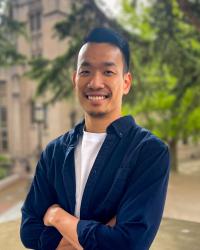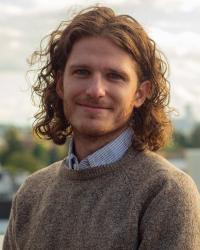The Department of Political Science fosters groundbreaking research that tackles pressing global challenges, blending rigorous scholarship with real-world relevance. This ethos is exemplified in the work of graduate students Brian Leung and Ian Callison, whose dissertations—supported by prestigious grants—illuminate the complex intersections of power, accountability, and policy.
Both projects reflect the department’s commitment to methodological innovation, from text analysis to cross-national datasets, and its collaborative culture—where faculty, staff, and peers provide indispensable mentorship. As Leung and Callison acknowledge, their work thrives thanks to the department’s unique blend of intellectual freedom, interdisciplinary support, and a vibrant academic community dedicated to advancing both scholarship and practical change.
Brian Leung

"My dissertation examines how firm lobbying shapes legislators’ positions and rhetoric on free trade, focusing on the evolution of the U.S.-China trade consensus. I trace this shift from the 2000 Congressional vote to grant China Permanent Normal Trade Relations (PNTR) to the present era marked by technological competition and recurrent trade wars. I investigate how certain U.S. firms strategically cite Chinese state actions detrimental to their business to mobilize anti-trade coalitions in Congress through lobbying. Supported by APSA’s Doctoral Dissertation Research Improvement Grant (DDRIG) and the Smith Richardson Foundation’s World Politics and Statecraft Fellowship, my research leverages language models to analyze large-scale textual data from firms’ financial filings and the Congressional Record. I complement these quantitative insights with archival research and elite interviews.
This project reflects my eclectic journey that bridges academia, advocacy, and activism. I am deeply grateful to the Department and my Dissertation Committee, especially Susan Whiting, for offering not only intellectual rigor but also the freedom for me to explore paths and pursue questions of both personal and real-world significance. I am also appreciative of the administrative support from the Department, particularly from Ed Connery, throughout the process. I am indebted to a very supportive alumni and peer community, especially Bree Bang-Jensen and Ian Callison, for sharing their experiences with grant applications. I hope to reciprocate the generosity so please feel free to reach out if I can offer any help with your application!"
Ian Callison

"In my dissertation, I explore the impact civilian-enforced accountability has in the production of political violence against non-combatants. Specifically, I seek to understand the puzzling presence of Pro-Government Militias (PGMs) across so many civil wars, and why certain human rights abuses are outsourced to PGMs while others are carried out by regular military actors. Building off the argument that PGMs are capable of providing plausible deniability, I argue that states’ decisions to deploy PGMs is a civilian-driven phenomena, where state leaders weigh potential accountability costs against the strategic gains from violence in an `accountability-effectiveness tradeoff.’ I am using APSA DDRIG funds to complete an original cross-national dataset measuring coordination between PGMs and official state forces in terms of geography, operations, leadership, membership, and information. Findings from this analysis are supplemented by a survey experiment in Colombia and sub-national case studies.
In my time as a graduate student in the political science department at UW, I have been incredibly grateful for mentorship and support from faculty, staff, and other graduate students in the department. In particular, I would not have completed the application for this award, finalized a budget, nor received the funds without the help of Ann Buscherfeld, Ed Connery, and Ling Fu. Additionally, I am thankful to have a committee in Geoff Wallace, Rachel Cichowski, and Jon Mercer, who champion my research, challenge me intellectually, and give me confidence to aim high. Finally, I am indebted to Megan Erickson, Morgan Wack, and Bree Bang-Jensen, who graciously offered their own application materials to serve as inspiration, and to countless other graduate students who have been sources of fun and encouragement."
The work of Brian Leung and Ian Callison underscores how the Department of Political Science empowers scholars to ask bold questions—questions that bridge theory and practice, challenge conventional wisdom, and illuminate hidden mechanisms of power. Their projects, fueled by rigorous methodology and real-world urgency, reflect the department’s commitment to fostering research that matters: work that reshapes trade policy debates, holds perpetrators of violence accountable, and equips future scholars to think critically and collaboratively.
As both students emphasize, none of this would be possible without the department’s culture of mentorship, where faculty, staff, and peers provide not just guidance, but the freedom to innovate. Leung and Callison’s journeys remind us that political science is not just about understanding the world—it’s about changing it, one question at a time.